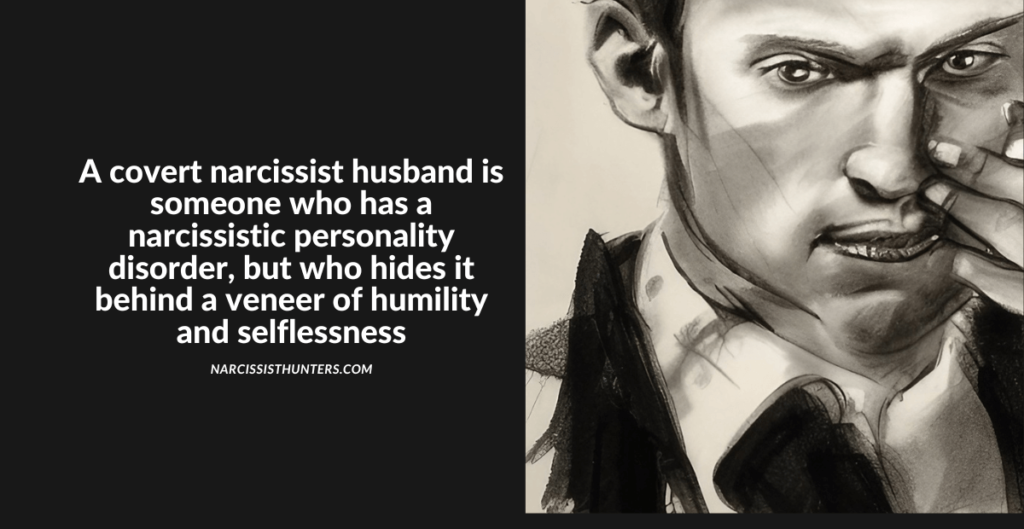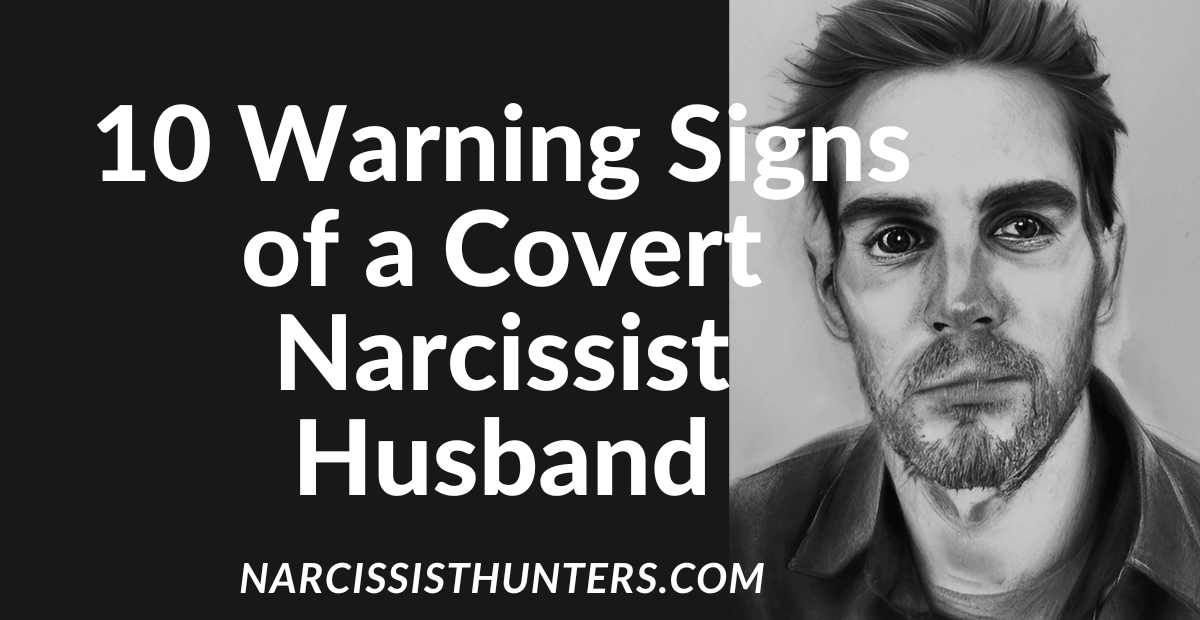Covert Narcissist husbands are prevalent in emotionally abusive relationships. They often display charming and charismatic traits that initially attract partners, but after some time, these traits can also signify red flags for emotional abuse. Living with a narcissistic husband can have a severe impact on mental and emotional health. It’s essential to recognize the warning signs of this disorder and to know how to protect yourself before it’s too late.
The article will provide detailed information about covert narcissist husband, how to recognize the signs of a covert narcissistic husband, and how to protect yourself from emotional harm. We will also offer advice on how to confront the problem and how to move on from a narcissistic relationship.
What is a Covert Narcissist Husband?

A covert narcissist husband is someone who has a narcissistic personality disorder, but who hides it behind a veneer of humility and selflessness. Unlike an overt narcissist, who is loud and boastful about their accomplishments and superiority, a covert narcissist operates in a more subtle and insidious way.
They may present themselves as caring, empathetic, and self-sacrificing, but in reality, they are driven by a deep need for admiration, control, and attention.
Living with a covert narcissist husband can be a confusing and difficult experience. On the one hand, they may seem like the perfect partner — supportive, loving, and attentive. But on the other hand, they may be manipulative, controlling, and emotionally abusive.
They may use tactics like gaslighting, blame-shifting, and
triangulation to keep their partner off-balance and under their control.
Signs of a Covert Narcissist husband
It can be challenging to identify a covert narcissist, especially if they are your husband. Unlike overt narcissists who are loud and attention-seeking, covert narcissists are the quiet manipulators who hide behind their charm and calm exterior. They can be difficult to spot and can cause emotional damage that can take years to recover from. In this blog post, we will discuss ten signs to help you identify whether you have a covert narcissist husband.
1. Your narcissist husband has a fragile ego
Narcissists have a grandiose sense of self and are easily offended when criticized or challenged. If your husband struggles to handle criticism or is quick to blame others when he fails or makes a mistake, there is a high chance that he is a covert narcissist.
2. He plays the victim
Covert narcissists are experts at playing the victim. They often use their soft and calm voice to manipulate others into feeling sorry for them. If your husband constantly complains about how he is misunderstood or wronged by others, he could be a covert narcissist.
3. He lacks empathy
Narcissists have little regard for the feelings of others. If your husband is indifferent to your emotions or constantly dismisses your opinions, it could be a sign that he lacks empathy and is a covert narcissist.
4. He is a control freak
Covert narcissists crave control and will go to great lengths to ensure they get it. They will manipulate and gaslight you to make you doubt your own reality. If your husband always needs to have the final say, controls your finances and social life, he could be a covert narcissist trying to maintain control.
5. His behavior is unpredictable
Covert narcissists can have erratic behaviors that can be confusing and difficult to handle. They can be kind and thoughtful one day and then be emotionally abusive the next. If your husband’s behavior is unpredictable and you find it hard to know what to expect, he could be a covert narcissist.
6. He is always seeking validation
Narcissists need constant validation from others to feed their grandiose sense of self. If your husband is always seeking validation from you or others, making everything about him, or acting like the smartest person in the room, he could be a covert narcissist.
7. He uses silent treatment and stonewalling
Covert narcissists often use the silent treatment and stonewalling as a way of controlling their victims. If your husband withdraws emotionally from you and refuses to have a conversation, he could be a covert narcissist trying to punish you for not following his rules.
8. He uses guilt-tripping
Narcissists are experts at making their victims feel guilty for not giving them what they want. If your husband often makes you feel guilty for not doing what he wants, it could be a sign that he is a covert narcissist trying to manipulate you into submission.
9. He lacks respect
Covert narcissists often lack respect for boundaries, opinions, and feelings of their partners. If your husband frequently crosses your boundaries, disregards your feelings, or dismisses your opinions, he could be a covert narcissist.
10. He has a sense of entitlement
Narcissists firmly believe that they are entitled to everything they want, regardless of how it affects others. If your husband has no regard for the needs or feelings of others, belittles your accomplishments, or uses your resources without your permission, he could be a covert narcissist.
Living with a Covert Narcissist Husband


“Living with a covert narcissist husband is like trying to live in a house made of mirrors, where every reflection is distorted and twisted to serve his ego.”
— Fahim Chughtai
Living with a covert narcissist husband can be an incredibly difficult experience. They are often very secretive and hard to read, making it extremely difficult to understand them and their needs. They may expect special attention or treatment, manipulate those around them to fulfill their wishes, or use their passive aggressive behavior to show displeasure in an indirect way.
This kind of environment can bring a great deal of confusion and chaos into the marriage itself, leaving the wife feeling unheard and neglected while constant fear of displeasing him remains in the air.
This type of relationship has long-term effects: It could cause depression, anxiety, feelings of worthlessness or self-doubt, reduced trust in relationships and even physical health issues.
Why Do Covert Narcissists Get Married?
Covert narcissists often don’t recognize their own narcissistic tendencies, making them unable to regulate and consciously manage the unhealthy traits of their personality. They may seek out relationships because it validates their sense of self-importance and fuels their grandiose fantasies, allowing them to feel powerful and in control.
On the other hand, they may attempt to build a stable relationship inside while they struggle with the intensity of their emotions on the outside. It could also be that they are attracted to people who are vulnerable or weak so as to exploit them for personal gain.
Ultimately, these motivations contribute to why covert narcissists get married — either through lack of self-awareness, need for validation and control, or pleasure in exploiting a partner’s vulnerability.
Covert Passive Aggressive Narcissist Husband
Covert Passive Aggressive Narcissist Husbands are often difficult to discern from a run-of-the-mill covert narcissist husband.
The main difference between the two is in their methodology. Where covert narcissists may be passive and preferring indirect ways to gain power or approval, covert Passive Aggressive Narcissist Husbands will instead use tactics such as gossiping, manipulation, withholding affection, and sulking to attempt to control their partners.
These aggressive behaviors are designed to undermine the autonomy of their partner and force them into submission. Ultimately, recognizing the subtle differences between these two types of husbands is key in mitigating the toll that a damaging relationship can have on both parties involved.
Covert Narcissist Husband and Cheating

Covert narcissist husbands often display a pattern of manipulative cheating in relationships. This type of husband typically has a need to control, often masking it with fantasies and lies to make themselves appear more virtuous than they actually are.
They may be very adept at presenting a ‘perfect’ image to the outside world — all while engaging in secret infidelities. These individuals may be adept at making their partners feel guilty for reacting negatively to betrayal, often due to their superiority complexes.
Because of this distorted sense of reality, covert narcissist husbands can be especially difficult when it comes to reconciling relationships that have been damaged due to cheating behavior.
Covert Narcissist husband vs Overt Narcissist husband
A covert narcissist husband is often much harder to identify than an overt narcissist husband, as their approach to gaining attention and admiration for themselves is far more subtle. They may use specific tactics such as using conversations to draw attention to themselves or garnering sympathy from friends and family instead of actively seeking recognition for their own achievements or strengths.
An overt narcissist husband, on the other hand, will behave in a more domineering manner, wanting everyone around them to recognize and admire their strengths while disregarding the accomplishments of others. An overt narcissist also tends to be more demanding in their relationships and have much higher expectations than a covert narcissist.
Both types can be difficult to handle, but recognizing which style of narcissistic behavior you are dealing with can help you find ways to manage the situation more effectively.
Dealing with Covert Narcissist Husband
If you have a covert narcissist husband, you must learn healthy ways of coping with his behavior because your emotional wellbeing is at stake.
1. Recognize the Signs
The first step in dealing with any problem is recognition. Recognizing a covert narcissist husband can be difficult, especially if you have lived with him for a long time. However, there are some signs that you can look out for.
For instance, a covert narcissist husband will always try to make himself look good in front of others. He might criticize or belittle you in private, but he will praise you in public just to maintain a good image. He will also demand your undivided attention and admiration, and will often use manipulation to get his way.
2. Don’t Take the Blame
A covert narcissist husband loves to make you feel guilty for his actions. He will blame you for everything that goes wrong in your relationship. He will make you feel as though you are the one who is crazy, unreasonable, and irrational.
Never allow your husband to make you feel this way. You are not the problem; he is. You need to stand up for yourself and refuse to take the blame for his actions.
3. Set Boundaries
A covert narcissist husband will test your boundaries constantly. He will push you beyond what you can handle and expect you to follow his whims.
Therefore, it is essential that you set clear boundaries that cannot be crossed.
For instance, if your husband repeatedly belittles you, make it clear that it is unacceptable and that you will not tolerate it. Stick to your boundaries and be firm.
Download Boundaries worksheet free to enforce boundaries.
4. Seek Support
Dealing with a covert narcissist husband is emotionally draining. Therefore, seeking support from family, friends, or a therapist is vital in maintaining your emotional wellbeing. Support can provide you with much-needed validation, reassurance, and encouragement. It can help you stay strong and resilient in the face of your husband’s manipulations.
5. Consider Leaving the Covert Narcissist husband
Living with a covert narcissist husband may be the hardest decision you’ll ever make, but it may also be the best decision for your emotional and physical wellbeing.
If your husband is unwilling to change and continues to belittle, manipulate, or abuse you, it’s time to leave. You deserve to be with someone who loves and respects you.
Last words
In conclusion, recognizing the warning signs of a covert narcissistic husband is a crucial step towards protecting oneself from emotional abuse. In this article, we have explored ten different signs that can often indicate a Covert narcissist husband, ranging from manipulative behavior to a lack of empathy.
The earlier one recognizes these warning signs, the easier it becomes to confront the issue and take appropriate action. It’s essential to know that by seeking help and support, it’s always possible to come out of the cycle of narcissistic abuse and regain control of one’s life.
If you find yourself struggling in a relationship with a covert narcissist, it’s essential to reach out for support. Several resources are available, including therapy, support groups, and counseling centers. Remember that you are not alone in this struggle, and there are people and groups out there willing to offer support and guidance.
In the comments section, we invite you to share your own experiences and tips on dealing with a covert narcissistic husband.
Together, we can create a supportive and empowering community that helps others navigate the emotional challenges of dealing with a narcissistic partner. Remember that you are worthy of love and respect, and you deserve to live a happy and fulfilling life.
